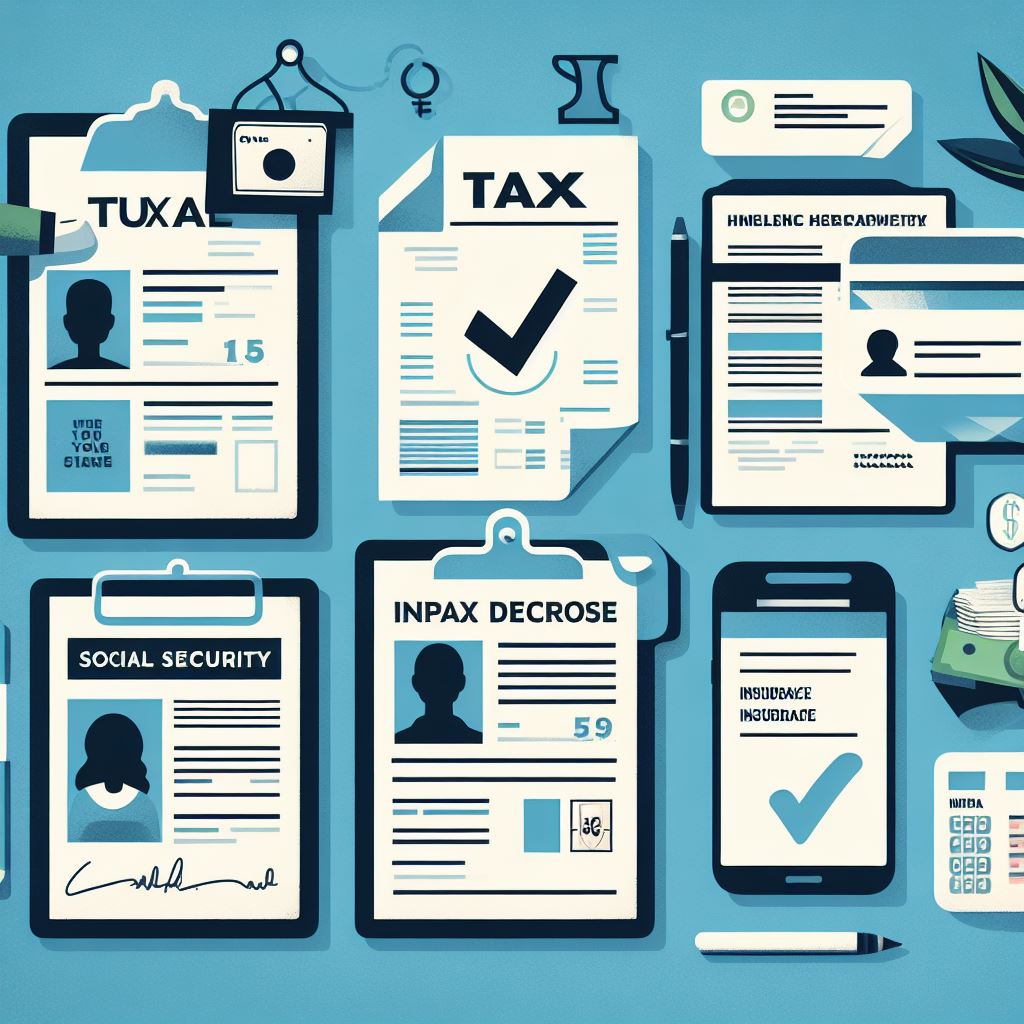Six Key Documents for Health Insurance Applications

Are you ready to take charge of your health insurance application process? Don’t worry, we’ve got you covered!
In this article, we’ll guide you through the six key documents you’ll need to have at your fingertips. From personal identification to proof of income, we’ll help you gather all the necessary paperwork.
So, grab a pen and get ready to tackle those forms with confidence. Remember, preparation is the key to success!
Key Takeaways
- Personal identification documents such as a government-issued photo ID, Social Security number, proof of residency, and proof of income or employment are required for health insurance applications.
- Proof of citizenship or legal status, such as a birth certificate or immigration document, is important in the application process to ensure only eligible individuals receive coverage.
- Proof of income is necessary to determine eligibility, and it can be demonstrated through pay stubs, tax returns, or other relevant documents.
- A valid Social Security number is required to verify identity and eligibility for coverage, access personal and financial information, and prevent fraud.
Personal Identification
To apply for health insurance, you’ll need to provide personal identification documents. These documents are crucial for verifying your identity and ensuring that you’re eligible for coverage.
The first document you’ll need is a valid government-issued photo ID, such as a driver’s license or passport. This ID will confirm your identity and ensure that the insurance provider is dealing with the right person.
Next, you’ll need to provide your Social Security number. This is a unique identifier that helps the insurance company track your medical records and process your claims accurately.
Additionally, you may be required to provide proof of residency, such as a utility bill or lease agreement. This confirms that you’re a resident of the state where you’re applying for insurance.
Finally, some insurance providers may ask for proof of income or employment, such as pay stubs or tax returns. This helps them determine your eligibility for certain subsidies or discounts.
Proof of Citizenship or Legal Status
You will need to provide an article of proof that verifies your citizenship or legal status when applying for health insurance. This is an important requirement to ensure that only eligible individuals receive coverage.
The most common document used to prove citizenship is a birth certificate issued by a government authority. If you weren’t born in the country where you’re applying for health insurance, you’ll need to provide an immigration document that proves your legal status, such as a permanent resident card or a valid visa.
It’s crucial to submit these documents accurately and in a timely manner to avoid any delays or complications in the application process.
Once you have gathered the necessary proof of citizenship or legal status, you can proceed to the next step of providing proof of income. This information is crucial for determining your eligibility for certain health insurance programs and subsidies.
Proof of Income
Once you have provided the necessary proof of citizenship or legal status, it’s important to demonstrate your income when applying for health insurance. Proof of income is a crucial document that helps insurance providers determine your eligibility for certain programs and subsidies. It provides them with a clear picture of your financial situation and helps them assess how much you can afford to pay for your health insurance premiums.
When submitting proof of income, you need to provide accurate and up-to-date information. This can include documents such as pay stubs, tax returns, or a letter from your employer stating your current income. If you’re self-employed, you may need to provide profit and loss statements or bank statements to verify your income.
It is essential to ensure that the documents you submit are clear and legible. Make sure to include all relevant information, such as your name, employer’s name, and the period covered by the income statement. If you receive income from multiple sources, be sure to include all of them to give a comprehensive view of your financial situation.
Social Security Number
Provide your Social Security Number when applying for health insurance. Your Social Security Number is a unique nine-digit number issued by the Social Security Administration to track your earnings and ensure accurate record-keeping for Social Security benefits. When applying for health insurance, your Social Security Number is required to verify your identity and eligibility for coverage. It’s an essential piece of information that helps insurance providers efficiently process your application and determine your eligibility for benefits.
Your Social Security Number is used by health insurance companies to access your personal and financial information from various databases, such as the Internal Revenue Service (IRS) and the Social Security Administration (SSA). This information is necessary to evaluate your income, determine your eligibility for subsidies or tax credits, and calculate your premium. Additionally, your Social Security Number helps prevent fraud and ensures that your information is accurately reported to government agencies.
When providing your Social Security Number on a health insurance application, it’s crucial to ensure that you do so securely. Be cautious when sharing this sensitive information and only provide it through secure and trusted channels. Protecting your Social Security Number is essential to safeguarding your identity and preventing identity theft.
Current Health Insurance Information
When applying for health insurance, it’s important to include information about your current health insurance coverage. This information helps insurers understand your current healthcare needs and ensure that you receive the appropriate coverage. To provide accurate details, you should include the name of your insurance company, the type of plan you have (such as HMO or PPO), and the start and end dates of your coverage.
Additionally, it’s crucial to mention any dependents covered under your policy, including their names and dates of birth. If you have any other health insurance policies, such as through your employer or spouse, be sure to include those as well.
Providing accurate and up-to-date information about your current health insurance coverage is essential for a smooth application process and to ensure that you receive the most appropriate coverage for your needs. By including this information, you can help insurers assess your healthcare requirements and make informed decisions about your health insurance options.
Frequently Asked Questions
What Other Types of Personal Identification Documents Are Acceptable for Health Insurance Applications Besides Driver’s Licenses and Passports?
Other types of personal identification documents acceptable for health insurance applications, besides driver’s licenses and passports, include birth certificates, social security cards, and military IDs. These documents are used to verify your identity and eligibility for coverage.
Is a Birth Certificate Sufficient as Proof of Citizenship or Legal Status, or Are Other Documents Required?
A birth certificate alone is not sufficient as proof of citizenship or legal status for health insurance applications. Other documents, such as a passport, naturalization certificate, or permanent resident card, may be required.
How Can Self-Employed Individuals Provide Proof of Income for Health Insurance Applications?
You can provide proof of income for health insurance applications as a self-employed individual by submitting your tax returns, profit and loss statements, bank statements, or other financial documents that show your income.
Are There Any Alternative Options for Individuals Who Do Not Have a Social Security Number?
If you don’t have a social security number, there are alternative options available for health insurance applications. Explore options like Individual Taxpayer Identification Number (ITIN) or applying through your spouse’s social security number.
What if an Individual Does Not Have Any Current Health Insurance Information to Provide for the Application?
If you don’t have any current health insurance information to provide for the application, you may need to contact the health insurance provider directly and ask for alternative options or requirements.



